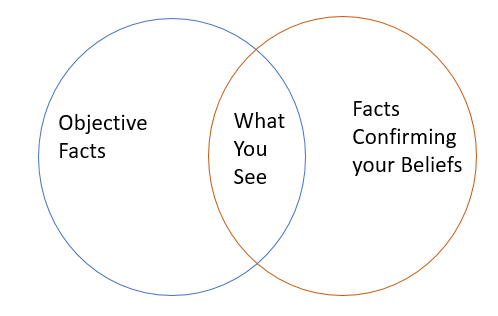A Breakdown of the Impact of Confirmation Bias
Photo above found here
When I looked at the phrase "confirmation bias," I wondered how damaging could it really be to a world where so many people interact with so many other people's opinions. The answer is it could be very damaging to the truth behind a situation. So what is confirmation bias? Confirmation bias is "the tendency to process information by looking for, or interpreting, information that is consistent with one’s existing beliefs." Due to this, when you come across information that is inconsistent with your belief, you often automatically dismiss it as incorrect. In a simple, non-damaging example, if you were to meet a person with brown hair, and they were annoying, you would assume everyone with brown hair is annoying. When you meet another person with brown hair that actually was annoying, it will confirm your belief that all brown-haired people are annoying, even though that's not reasonably true.
Attached here and shown below is a link to examples of confirmation bias and how to think more logically when presented with information that disagrees with something you currently believe.
History
Humans are known to process information they receive in an "illogical, biased manner" (Casad). Confirmation bias in another example of that, and is even more common to see happen when the information being given to them directly impacts their values or personal feelings. This is why when discusses politics, it is something that occurs so often. People's political viewpoints and parties are often a direct correlation to their morals and values as human beings. When someone has no interest in the topic of discussion, it is rare for confirmation bias to occur. Another reason confirmation bias occurs is due to a person's self-esteem. People naturally do not want to be wrong, and admitting that an opinion or fact you once believed in can be proven incorrect, rather than reassured for its correctness, could "suggest one is lacking intelligence" (Casad).
Evidence
There is proof that confirmation bias occurs when decision making and formulating ideas. "In studies examining the my-side bias, people were able to generate and remember more reasons supporting their side of a controversial issue than the opposing side. Only when a researcher directly asked people to generate arguments against their own beliefs were they able to do so" (Casad). This shows that people are able to "generate" other ideas, but often do not want to believe in them due to their previous confirmed belief. People are more likely to find positive information to reaffirm their beliefs, rather than allowing themselves to run into negative information that would be contrary to their current beliefs. Confirmation bias happens more than just when being presented with information; it also occurs when meeting new people. "If people are told what to expect from a person they are about to meet...people will look for information that supports their expectations" (Casad). If I met someone and I was told they were really smart and were going to be a lawyer one day, confirmation bias would incline me to ask them where their favorite place to study on campus is rather their where their favorite place to party on campus is. That is because with the information I was given before, I already thought they would be the type of person to study on Saturday nights, rather than go out with friends.
Why does confirmation bias matter?
Confirmation bias matters because people might allow themselves to believe something that is false due to their ability to find other false information that reaffirms them. Just because two sources say the same thing, doesn't mean that those two sources are true. It also matters in some of the most important professions such as medicine and law. When a doctor is given a patient, based on little to no scientific information, they may believe a diagnosis for a particular patient, without allowing themselves to hear or learn all of the symptoms or pains that the patient is dealing with. This preexisting bias may lead the doctor to treat the patient for what they "believe" they have, rather than what they really have (Casad). In the example of law, due to the judge or the jury preexisting biases about a person or situation, they may not allow themselves to hear the whole story from both sides before coming to their decision. This form of confirmation bias is important to be able to spot and avoid, especially when the decisions that these judges and jurors are making could result in people's lives being spent in jail or prisons for something they didn't do.
Casad, B. (2019, October 09). Confirmation bias. Retrieved July 04, 2020, from https://www.britannica.com/science/confirmation-bias

Comments
Post a Comment